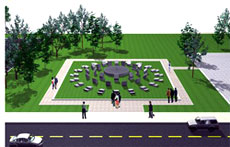
All 63 provinces and cities will contribute a single object each to the
1,000 ones that the time capsule will eventually hold. Apart from
objects representing each province and city, the remaining 937 items
which represent the country’s cultural characteristics and technological
level will be selected by people nationwide.
Objects selected for the time capsule include typical items used in daily life
and stored in the 1,000 litre air-tight container, for future
generation to know more about life today. The container is made of
stainless steel.
The objects selected by cities and provinces will be typical of the
regions they originate from, summarising the culture, technological
level and lives of people living there. The objects can be simple,
everyday items such as the labels of famous products, magazines or
newspapers showing current events and current trends photographs, coins
or indicators of high technology such as DVDs and cell phones giving
future generation a profound insight into current life.
The container will be buried in the grounds of Hanoi Museum on Pham
Hung Street, Hanoi in September. On this site will be a lotus shape
monument symbolising the splendour and purity of the Vietnamese people, said Vu Phuong, Vice Chairman of Hanoi Culture Fund.
He first came across the novel idea to preserve items for future
generations while visiting Seoul, the capital city of the Republic of
Korea. Researchers and authorities from Seoul will help design and
construct the lotus-shape monument as a gift from Seoul to Hanoi.
The organising board will cooperate with 63 provinces and cities to
the regionally representative objects and will also call for the public
to suggest 937 others.
Suggestion should be sent to the organising board at Hanoi Department
of Culture, Sports and Tourism at 47 Hang Dau Street, or by email to
qvhhanoi@gmail.com. After consideration, the board will ask the People’s
Committee of Hanoi City to establish a board of leading cultural
activists, and scientists to select the most meaningful items.
In May, the organising committee will announce the list of selected
objects and an exhibition to display all the objects will be held on
August 6-15. Placing and sealing the time capsule will take place on
August 15.